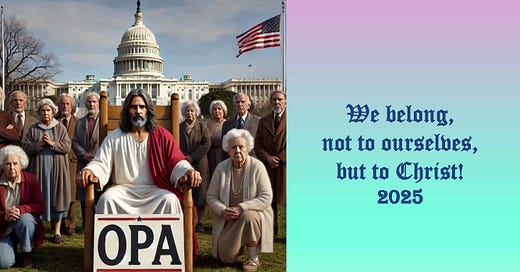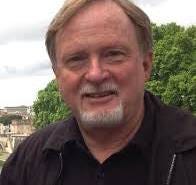Duane Larson: "We Belong, Not to Ourselves, But to Christ" 3
First: An Adventure with Fascism, Barmen, and Ted Peters
The guest author of this Substack post is Duane Larson. Duane Larson is a retired pastor and systematic theologian. In addition to several congregations over his career, he served as a professor of theology at the Lutheran Theological Seminary at Gettysburg (now United Lutheran Seminary), as a professor and President for Wartburg Theological Seminary, and a professor at the University of Houston. His published writing includes Care for the Sorrowing Soul, Healing Moral Injuries from Military Service and Implications for the Rest of Us, with Jeffrey Zust (Cascade: 2017); “Martin Luther’s Influence on the Rise of the Natural Sciences,” The Oxford Encyclopedia of Martin Luther (Oxford.com); and the soon forthcoming Ubi Deus Dixit, Where God Has Spoken: The Lutheran Doctrine of Two Kingdoms (Cascade: 2025).
We Belong, Not to Ourselves, But to Christ
My sincere thanks to Ted Peters, longtime friend and mentor, for inviting me to respond to his comments about the statement, “We Belong, Not to Ourselves, But to Christ,” produced by a group of retired Christian academics. We are mostly theologians sprinkled with outstanding political scientists, missiologists and more radiating from Chicago. Ted featured and addressed our statement here in his Substack post on March 24.[1]
We of our Old Professors Association (OPA! – the title fuses fun, self-aware humor and rhetorical accuracy) are mostly theologians sprinkled with outstanding political scientists, missiologists and more radiating from Chicago. We robustly engage each other and the issues of the day in monthly online meetings. The conversations are better than most of the faculty meetings we’ve endured over decades. You can surmise what has stirred our scholarly and existentially urgent conversations over the last several months. We asked whether (1) we should say something about the evident rise again of fascism, which we named as Christian Nationalism. If so, (2) to whom are we writing, and (3) given our primary audience, what should we say? The ordering is important. “Yes” was quickly and unanimously declared. Then we decided that (2) we individually would share the statement with our former students, colleagues, friends, and official networks.
This also explains why we did not all sign the one document. We preferred to call it a “resource” for our constituents to use as they will, rather than as a common statement of confession. We regard it as a work in progress. Y’all might help in improving on it. It could become formally a “Barmen-like Confession” as time goes on. And if any of us want to name it as personal confession, that’s all to the well and good.
For now, I’m happy to advance the conversation as best I can. In so confessing, I also want to make very clear that Kurt Hendel and I were not the writers of the statement. Every member of the group contributed. They then asked that I smooth it out with my framing and that Kurt ensure full representation. We were but scribes who snuck some of our own florilegia inside the margins.
Duane Goes On an Excellent Adventure with Ted
Now I do speak for myself as Ted’s invited respondent to his mild correction of our statement while expressing full alliance with our agenda. I will do this in three installments. With this post (1) I’ll try to answer Ted on the terminology matter. In the next post (2) I’ll address the theological substance of CN and argue why a discrete Lutheran political theology must counter the CN specifically, which is at the heart of greedy MAGA-ism that Ted would rather name and redress. In the final post (3), I will finally suggest some of what we as Christians must do to stop Trump.
So to (1). Ted thinks the term “Christian Nationalism” is a wrong descriptor and that it slanders genuine Christian evangelical siblings. He also thinks it is too close to what we’ve known as Christian civil religion to be referentially helpful, as if CN covers the gamut from anyone who is Christian and patriotic to white supremacists demanding American flags in white churches and the Ten Commandments posted in public-financed private schools. Ted has argued this for a while. He worries that we progressive Christians (though I and my OPA colleagues, I suspect, would admit to “selective progressivism”) blithely broad brush all evangelicals as retrograde at best and fascist at worst.
There’s a grain of truth in what Ted argues about naming. For us of liberal (classically-speaking) Christian DNA, we too easily call evangelicals “fundamentalists” and conflate their flag-waving with jack-booted nationalism. We’ve been re-active (as opposed to responsibly responding) with emotively weighted words. If we pause, breathe through our noses, and self-assess like good CPE students before we cold-call on the unmet patient in the ER, we can understand our own fear-borne triggered reactionarianism to reactionaries. But this doesn’t demand that we simply abandon the use of “the CN term,” like we do not abandon terms like “PTSD” and “Moral Injury” because they are now broadly misused too in such a way as to trivialize actual physical and psychic/emotional trauma inflicted by real hostile agents on military service members and abused women.
So, yes, we must be hyper-alert when the emotional heat of the day is dialed to broil. But caution does not mean abandonment of the terms. Caution means knowing and speaking specifically what we mean as public theologians when using common words of political parlance. Christian Nationalism is a global phenomenon again. CN refers to a very large percentage of Evangelicals. It also names certain Russian parts of Orthodoxy and even applies to some of Mainline Protestantism. CN also resonates with Catholic Integralism, as if Ayn Rand hooked up with Nietzsche to tell J.D. Vance what being Catholic is really about. CN values align with the historically documented attributes of corporatism, power lust, and cultural homogenization that constitute fascism.
These attributes describe specifically what Victor Orban applied to his Hungarian project that he himself proudly names as Christian Nationalism. In sum, CN has the status now of stipulated and conventional terminology. I may not like it when cultural linguistic neologisms get entrenched in public discourse. Journalists’ use of “take a listen” grates on me. But everyone knows what that means and I will have to go with the flow if I don’t want my voice drowned in the riptide. Convention compels public theologians to adapt to the term “Christian Nationalism” without using it indiscriminately.
More importantly, as a would-be public theologian I also have a keen central pastoral concern. Time is wasted and urgency is disrespected if when doing soul-care I perseverate on redefining terms like one of Job’s friends. Those for whom I care have questions and they want answers, and the words they know and use are words like “Christian Nationalist.” I and my colleagues, retired or not, have the personal time to think at length with precising language. My lay readers and hearers who worry about their faith and ethics don’t; not when they must work harder and longer now than a decade ago; not when the pillars of faith and democracy are assaulted before their eyes; especially not when the assaulters are gaslighting us all ad nauseum.
The Christians I know personally know in their faith-feeling-Gefühl-gut that the church and nation are in a state of spiritual exigency, and so we cannot perseverate on methodology and prologue. The public generally knows to what I refer with Christian Nationalism and they want to know more. The public knows that the Venn diagram I employ of a large circle named Evangelical Christians is not the same as its smaller circle within of Christian Nationalists. The public also knows that the smaller circle has metastasized and is yet unchecked. The public, or at least my small public, wants theological irradiation of that cell now and calling it by the common diagnostic name is an appropriate start. Glioblastoma is a more accurate term for a malignant tumor. But “brain cancer” is accurate enough and gets one’s attention.
Not a Bandwagon Argument, Exactly.
Consider also who else speaks CN responsibly. Prominent Evangelical and de facto public theologian David French does not worry about uttering “Christian Nationalist” and “Evangelical” in the same breath while also differentiating the evangelical wheat from nationalistic chaff. [2] His colleague Christian public intellectual and think-tanker Peter Wehner provides a master template of evangelical self-criticism with a depth, breadth, and temperateness to which I aspire, while not holding back on blaming Evangelicalism for fostering Christian Nationalism.[3] Wehner in print speaks mostly of Evangelicalism, but in informal conversation comfortably refers to CN.[4] So I’ll be comfortable too.
I respect and I’ll pray with real evangelical Christians anytime anywhere, as I have long done (I’ve had a warm spot for evangelicals ever since as a High School Junior I cuddled with Sherri in a Pentecostal Church balcony during the Wednesday service altar call). This is probably the time when I should say, too, and I mean it, that we “selective progressives” could do better at making real friends with evangelical others beyond our own tribe. When we pray and worship together, we do better when we must engage in the ecumenically mutual care, consolation, and exhortation of believers.
“Christian Nationalism” has cache beyond evangelicalism. We know politicians who claim the name. Outside that murky pool, articulate secular journalists, particularly our think-tank-based, public intellectuals, know what they are naming and do so with real humility and fear. From personal conversation with him and from his excellent new book, I garner that Jonathan Rauch, a very personable public intellectual who writes from his experience as gay and atheist, would affirm my praying with these fine evangelicals and my using the CN term. In an ironic Theology of the Cross twist, Rauch uses the CN term because it names things as they are. Rauch identifies it as the self-proud deviation from true Christianity that by its immoralism and colluding confusion of church and state is destroying the supporting pillars of institutional democracy.[5]
I don’t advert to these three public intellectual samples as warrants who because of their highly regarded station imply that “Duane’s correct” (a sly use of the argument to authority fallacy). They’re in my set list because the term CN communicates. I need not worry about slandering good Evangelicals when using the CN term. It is also the case now that real Christian Nationalists by any other name would not smell so sour. Euphemisms would be like slathering musk over whitewashed tombs (see what I did there?).
Next Time, Same Channel
To what then does “Christian Nationalism” refer? What is its content that we as Christians are called by God’s Holy Spirit to resist? And what is the distinctively “Lutheran” protocol for us to do so? I will address this in the next post, part two of my three part Ted-invited mini-series.
Substack PT 3268 Duane Larson: “We Belong, Not to Ourselves, But to Christ” 3
Lutheran Public Theology Debate
PT 3246 Project 2025 on Christian Nationalism
PT 3247 Anti-Anti-Christian Nationalism, Part 1
PT 3248 Anti-Anti-Christian Nationalism, Part 2
PT 3249 Anti-Anti-Christian Nationalism, Part 3
PT 3252 Is “Our Confession of Evangelical Conviction” the New Barmen?
OPA, “We Belong, Not to Ourselves, But to Christ” 1
Substack PT 3257. Ted Peters: We belong, not to ourselves, but to Christ 2
Substack PT 3268 Duane Larson: “We Belong, Not to Ourselves, But to Christ” 3
Substack PT 3269 Duane Larson: “We Belong, Not to Ourselves, But to Christ” 4
Substack PT 3270 Duane Larson: “We Belong, Not to Ourselves, But to Christ” 5
Substack PT 3271 Larry Ball: We Belong 6, Presbyterians Debate Christian Nationalism
Substack PT 3272 Brenda Denzler: We Belong 7, Response to Duane Larson
Substack PT 3273 Duane Larson, We belong 8, Response to Ball and Denzler
Substack PT 3274 Ted Peters: We belong 9: Lutherans Doing Public Theology
Notes
[1] To read our full document hosted on The Lutheran School of Theology website, click here. Don’t confuse the OPA statement with the much shorter LSTC faculty statement (click here).
[2] As in the New York Times OpEd section of April 3, 2025, where David French takes on the grifting indulgence sales of Paula White and calls out Evangelicals directly for their confused morals.
[3] Among so much by Wehner, see his thorough and foundational analysis “Where Did Evangelicals Go Wrong?” in The Atlantic (March 3, 2024).
[4] Compare Wehner’s take-down of self-identified Christian Nationalist Mike Johnson in The Atlantic (October 31, 2023) with the Brookings Institute Forum of February 8, 2023, “Understanding the Threat of Christian nationalism to American democracy today.”
[5] Jonathan Rauch, Cross Purposes, Christianity’s Broken Bargain With Democracy (Yale University Press, 2025).







